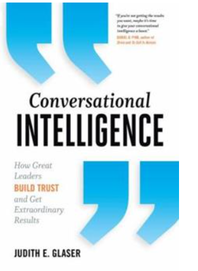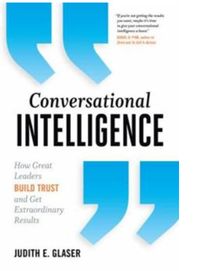Consulting Articles

John Glover
Origins of the Internet - Courtesy of the original founders (end of this document) Performance measurements: All about the Ks (KRIs, KGIs and KPIs) "Too many birds on the wire": From analog to Digital Telephony |
Blogs:

Tamsen (Thomi) Glover
Blogs:

November 2020:
WHY CONVERSATIONAL INTELLIGENCE IS A CRITICAL CONSULTING SKILL -- PART ONE:
Few people would argue that we are in stressful times, or that Covid doesn’t appear to be going away anytime soon. Further, most of us recognize that this indefinitely stretching future state is stressful in all kinds of ways.
Though doing business through a variety of on-line platforms is by now common place, many of us long for the face to face relationships that have been our primary way of consulting with our clients. Several of my clients have said that they find it almost impossible to “read” other people on ZOOM or whichever platform is being used. When we can’t “pick up” the “vibes” from others, as we have become accustomed to doing, probably quite skillfully, we feel we are at a real disadvantage in forming working partnerships.
Fortunately there is another approach that we can learn to improve our shared understanding and overall communication. And that is “Conversational Intelligence.” Many people have heard of emotional intelligence, that combination of skills that Daniel Goleman defined as self awareness, self management and relationship effectiveness. But the overriding question remains “How does my communication demonstrate these critical skills? And what can I do to create better partnerships with my clients? This is where conversational intelligence comes in.
Our brains have been evolving for many thousands of years. Our Neanderthal ancestors’ brains differed from ours in one primary respect. Their limbic brains and amygdala which is the back and lower part of the skull were highly sensitive. They needed to “know” when danger was close and when it was time to get away fast! They were obviously pretty good at that because they survived and evolved and eventually homo sapiens dominated. The critical difference in homo sapiens is the development of what is called the prefrontal cortex, that front part of the brain where our thinking resides, and our trust response.
Now every coach and consultant has learned about the essential role of trust in the client relationship. What we may not have learned is how the amygdala, that back part of our more primitive brain, can derail our prefrontal brain and trust building capacity in a heartbeat when we begin to feel threatened in any way; by business uncertainty and anxiety or mixed messages from others, never mind how much Covid-19 induced anxiety we are carrying. As the late Judith Glaser, the guru of conversational intelligence, says, “When we feel others want to own us or own our power - we fear harm and cannot open up with honesty.” (Conversational Intelligence p 55) ISBN: 1937134679.
As consultants whose task it is to partner with our clients we absolutely need shared trust and honesty. But if we are all walking around with a heightened sense of anxiety and fear - what then?
We need to move from “I “ (me as consultant, with lots of knowledge and of course the need to be successful) to “We”. There are three common conversational blind spots. The first blind spot is that we usually have solutions for client problems and unfortunately most humans have a high need to be right. In fact some say we are addicted to being right. Being right provides us with a dopamine high - feels really good - right? But what if I’m not? Blind spot 2 is failure to realize that when we feel anxious we release cortisol which closes down the prefrontal cortex - our thinking place. No problem solving or decision making there. Blind spot 3 is that, in addition when we think we know or recall what someone has said we actually recall what we have been thinking about what the other person has said. We therefore miss the connection.
In order for our own and our client’s internal dialogue to be firmly rooted in accurate communication we need therefore to ensure we have actually communicated with our clients, that we have actually understood one another. Work on those bind spots becomes essential.
“Tune in” to part two to see what we can do to improve our chances of understanding and being understood….
Thomi Glover, MA, MDiv, CMC, PCC,

December 2020:
WHY CONVERSATIONAL INTELLIGENCE IS A CRITICAL CONSULTING SKILL -- PART TWO. Building “we” relationships.
Last month I explored the critical role of conversational intelligence in effective consulting. We saw the way the amygdala, or lizard brain that has been with us for millions of years impacts not just what we do, the old fight or flight pattern, but also what we are able to hear and how we can move into trusting relationships. Without trust our clients are highly unlikely to want to work with us. Without trust our clients don’t see us as being “on their side.” How we communicate is critical for others to getting out of the lizard brain and into the prefrontal cortex where thinking, not just feeling, resides. And so it is critical to building trust. Further there is an old saying; “I know you think you heard what I said. But I’m not sure you heard what I meant.” And this goes on all the time. Just think of any interpersonal “argument” you have had - invariably miscommunication is part of the problem. To complicate things further different words mean different things for different people, never mind the inflection we might consciously or unconsciously use. Putting all these things together it is amazing we have any effective communication at all!
So what can we as professionals do to improve our client relationships, shared problem solving and mutual success? Fortunately there are some things that work, at least some of the time. First we need to create a shared understanding of success. Even if we think we have the perfect solution for the client’s challenge we need to ensure we have a shared understanding of what the challenge actually is and how important it might be. This requires open and mutual conversation where our clients feel safe in sharing their concerns or problems. One question I like to use is “If there was one thing that could really make a difference to the success of your team or organization what would it be? And what difference might that mean for you personally?” And the way we ask these questions is critical. We are tonal creatures. Our Neanderthal ancestors communicated with tonal sounds long before they had language. Anyone who has a dog knows how the animal responds to and expresses tone. How we say what we say makes a critical difference in what our clients hear, the extent to which they feel safe in sharing their challenges and ultimately to the way they can trust us or not. If our tone is the least bit too assertive let along aggressive, that can create fear and defensiveness, not the kind of partnering we need for “we” rather than “you” or “me”.
A similar conversational approach can be used with a team whether it is two or twelve. Ask each person on the team to talk about what success in their enterprise would look like to them, the difference it would make in how they did their job. And stay quiet and listen! Resist the urge to jump in with great ideas until everyone has spoken. Our deep listening speaks volumes about our willingness to really partner, not just create more business. Listen for where you hear the energy in people’s voices. Some people might be reluctant to speak up at first. Take the time to make it safe for everyone to acknowledge how they experience their challenges, especially if they fear that they might appear personally inadequate. Don’t let your own (I really need this contract…) amygdala high jack you into being reactive. Are our clients experiencing us as their legitimate partners in addressing a challenge?
And as I noted last month we need to be aware of the level of fear and anxiety that is simply “in the air” right now. Among other things it means we need to take extra time and extra care to build trusting relationships. Nearly everyone these days goes around with a heightened amygdala. Building trust, moving to the prefrontal cortex, takes time. Finally I believe that the additional conversational intelligence we can build now will serve us well in the days ahead - perhaps in ways we can’t even imagine. And if this kind of thinking is helpful to you, please feel free to contact me. It is a skill that we can all learn.
A final Quote: “To get to the next level of greatness depends on the quality of the culture, which depends on the quality of relationships, which depends on the quality of conversations. Everything happens through conversations.” – Judith E. Glaser
Thomi Glover, MA, MDiv, CMC, PCC,
WHY CONVERSATIONAL INTELLIGENCE IS A CRITICAL CONSULTING SKILL -- PART TWO. Building “we” relationships.
Last month I explored the critical role of conversational intelligence in effective consulting. We saw the way the amygdala, or lizard brain that has been with us for millions of years impacts not just what we do, the old fight or flight pattern, but also what we are able to hear and how we can move into trusting relationships. Without trust our clients are highly unlikely to want to work with us. Without trust our clients don’t see us as being “on their side.” How we communicate is critical for others to getting out of the lizard brain and into the prefrontal cortex where thinking, not just feeling, resides. And so it is critical to building trust. Further there is an old saying; “I know you think you heard what I said. But I’m not sure you heard what I meant.” And this goes on all the time. Just think of any interpersonal “argument” you have had - invariably miscommunication is part of the problem. To complicate things further different words mean different things for different people, never mind the inflection we might consciously or unconsciously use. Putting all these things together it is amazing we have any effective communication at all!
So what can we as professionals do to improve our client relationships, shared problem solving and mutual success? Fortunately there are some things that work, at least some of the time. First we need to create a shared understanding of success. Even if we think we have the perfect solution for the client’s challenge we need to ensure we have a shared understanding of what the challenge actually is and how important it might be. This requires open and mutual conversation where our clients feel safe in sharing their concerns or problems. One question I like to use is “If there was one thing that could really make a difference to the success of your team or organization what would it be? And what difference might that mean for you personally?” And the way we ask these questions is critical. We are tonal creatures. Our Neanderthal ancestors communicated with tonal sounds long before they had language. Anyone who has a dog knows how the animal responds to and expresses tone. How we say what we say makes a critical difference in what our clients hear, the extent to which they feel safe in sharing their challenges and ultimately to the way they can trust us or not. If our tone is the least bit too assertive let along aggressive, that can create fear and defensiveness, not the kind of partnering we need for “we” rather than “you” or “me”.
A similar conversational approach can be used with a team whether it is two or twelve. Ask each person on the team to talk about what success in their enterprise would look like to them, the difference it would make in how they did their job. And stay quiet and listen! Resist the urge to jump in with great ideas until everyone has spoken. Our deep listening speaks volumes about our willingness to really partner, not just create more business. Listen for where you hear the energy in people’s voices. Some people might be reluctant to speak up at first. Take the time to make it safe for everyone to acknowledge how they experience their challenges, especially if they fear that they might appear personally inadequate. Don’t let your own (I really need this contract…) amygdala high jack you into being reactive. Are our clients experiencing us as their legitimate partners in addressing a challenge?
And as I noted last month we need to be aware of the level of fear and anxiety that is simply “in the air” right now. Among other things it means we need to take extra time and extra care to build trusting relationships. Nearly everyone these days goes around with a heightened amygdala. Building trust, moving to the prefrontal cortex, takes time. Finally I believe that the additional conversational intelligence we can build now will serve us well in the days ahead - perhaps in ways we can’t even imagine. And if this kind of thinking is helpful to you, please feel free to contact me. It is a skill that we can all learn.
A final Quote: “To get to the next level of greatness depends on the quality of the culture, which depends on the quality of relationships, which depends on the quality of conversations. Everything happens through conversations.” – Judith E. Glaser
Thomi Glover, MA, MDiv, CMC, PCC,